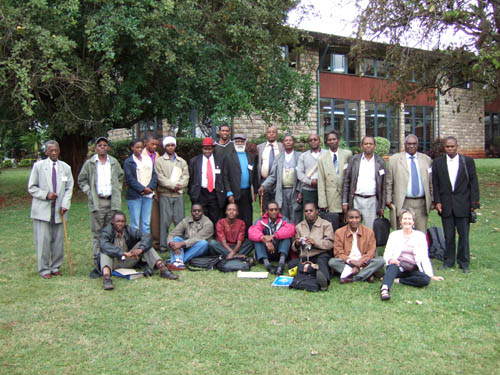You are here
- Home
- Managing Heritage, Building Peace: Museums, memorialisation and the uses of memory in Kenya
- Events
- Workshop: Museums and Heritage Research
Workshop: Museums and Heritage Research
Museums and Heritage Research, 20-21 July 2007
United States International University (USIU), Nairobi, Kenya
A wide variety of heritage stakeholders and people interested in heritage issues gathered for this two-day workshop on the USIU campus, held by kind permission of the Faculty of Arts and Sciences. They included Kenyan citizens, scholars and students, representatives of community and peace museums groups, and staff from National Museums of Kenya (NMK). The aim was to share initial findings from the pilot research project (2006-7), discuss heritage developments in Kenya, and take the research and UK-Africa collaboration forward.
The event was co-hosted by Dr Lotte Hughes and Prof. Karega Munene, with the support of Acting Dean Prof. Frederick Iraki, who gave the keynote address - 'The Linguistic Parameter in the Preservation of the Collective Memory: A Kenyan perspective'.
 |
Workshop delegates gather at USIU. Photo: Heather Scott
Summary
Many of the papers, and informal oral presentations, focused on colonial legacies which included: loss of language, estrangement from culture and environment, educational inadequacies, divisions between ethnic groups, the fraught foundations of independent Kenya, and ideological differences whose roots lie in the early 1960s and the differences between the Kapenguria Six. Speakers noted that the state has only recently recognised the need for public memorialisation, for example of freedom fighters and other types of national heroes and heroines.
"Kenyan independence is comparable to a football match - one team won, but the trophy went to the spectators. But the very fact that we are meeting here today is an indication that all is not lost" Prof. Macharia Munene, USIU
Representatives from NGOs and community-based organisations described their efforts to conserve heritage, including local environments, and how they are using traditional peace mechanisms to build peace and reconciliation at grassroots level. Community mapping of forests is emerging as an important way of restoring ownership of history and heritage, as well as educating communities about their environment and responsibilities for it. Private curators described their activities and vision. Staff from National Museums of Kenya outlined plans to gather oral testimony from elders; the information will be used in the renovated history gallery when it re-opens. There was an update on the activities of the committee tasked by government to find out which heroes and heroines Kenyans want to see memorialised. International comparisons were drawn between approaches to heritage in Kenya, Colombia, West and southern Africa.
"Our thinking is born in our territory." Kariuki Thuku, Porini Association
Members of civil society called for assistance with preserving material culture; the return of certain artefacts from NMK; and for more dialogue and transfer of knowledge between scholars and citizens, elders and youth. It was claimed: "Schooling takes place in the forest, not in papers or in schoolrooms." Speakers highlighted the need for peace education to resolve social conflict, and noted that certain sites of conflict, such as that of the 1953 Lari Massacre, require cleansing by traditional means. Peace museums urgently need to document peace traditions, with the help of elders.
"This meeting is just an appetizer, we would like more." Dr C. M. Kamara, Thunguma Museum, Nyeri
Other speakers warned of the danger of Balkanization along ethnic lines if community museums only focused narrowly on conserving the culture of individual ethnic groups. It was suggested mobile museums could be used to promote knowledge and understanding between different communities. Public misunderstandings about the National Museums and Heritage Act 2006 were cleared up, and heritage aspects of the draft Constitution explained. It was pointed out that the current Constitution says nothing about cultural human rights, and that "the new Draft is also silent on our rights to culture".
"Peace museums help counteract feelings of anonymity and a sense of isolation in society." Timothy Gachanga, Community Peace Museums Foundation
It became clear that Kenyans have very different perceptions of the past, the roles and significance of historical characters, and the uses of social memory. But delegates agreed on the need for more documentation, more dialogue, and the value of forging partnerships between citizens, scholars, and different heritage sectors - both state and non-state.
Paper: Timothy Gachanga, 'Educating for Peace through Community Peace Museums'
Paper: Lotte Hughes: 'A Brief Overview of Heritage in Kenya and Africa'
Paper: Karanja Mirara, 'Challenges of presenting history in museums'
Paper: Kariuki Thuku, 'Colombian-Amazon: Territory, Heritage and Cosmovision'